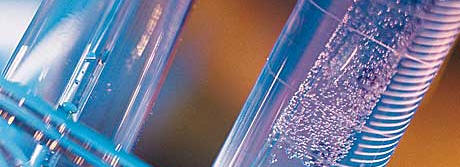
|
Eugene Dakin Ph.D., P.Chem Professional Chemist |
|
|
|
|
Oilfield Chemistry
A little more in-depth
Oilfield Chemistry is a fascinating area that encompasses Heavy oil, Light Oil, Natural Gas, and Water production-treatment-and sales. Eugene is a member of the North American Corrosion Engineers (NACE) and the Society of Petroleum Engineers (SPE), and informative troubleshooting comments can be viewed in the Technical Interest Groups (TIG's) at http://www.spe.org.
Once the hole has been drilled and production starts, production chemicals are used to keep the well flowing. This can be with the aid of: asphaltene products, paraffin products, anti-scale chemicals, foams, kinetic and mechanical hydrate products, and more.
Corrosion can be a great concern and is controlled by: Anti-corrosion chemicals, biocides, water treatment products, with properly designed pigging programs. Complete corrosion programs are assembled to limit/prevent corrosion as required by the Energy and Utilities Board (EUB).
Separation of natural gas, oil, and water is accomplished by heat and de-emulsifying compounds. When separating in a treater or separator, usually tests are performed on-site and specific blends are created for each field.
Separation of water/moisture/acid gasses from natural gas is accomplished by dehydration, refrigeration, and sweetening units.
Co-mingling of produced water can cause scaling, which is controlled/eliminated by the use of anti-scaling agents.
Future areas that will be added to this section are: Natural Gas Dehydration, Natural Gas Sweetening, Downhole Production, Separation, Stimulation, and more.
Advanced Chemical Product Areas
Paraffin Inhibitors - Prevent further buildup of paraffin molecules on downhole equipment.
Paraffin Dispersants - Promotes the breakup and dissolving of paraffins from equipment.
Corrosion Inhibitors - Limits or prevents corrosion from occurring. Usually lengthens the lifetime of equipment by a minimum factor of 10.
Scale Inhibitors - Prevents further buildup of scale. This can be present in many forms. Analysis is required.
Gas Hydrate Control - Two various areas of hydrate control exist, 1) mechanical, and 2) kinetic.
Scale Removers - Removes scale that has adhered to equipment surfaces.
Asphaltene Inhibitors - Prevents the buildup, and lowers the amount of asphaltene buildup.
Asphaltene Dispersants - Removes asphaltene buildup quickly, and effectively.
Demulsifiers - Effective separation and remove of oil from water, and water from oil.
EOR - Chemically induced Enhanced Oil Recovery of petroleum from reservoirs.
Reservoir Stimulation - Injection of chemicals to aid in the increased recovery of oil near the well bore.
Conventional Sandstone Acidizing - Opening plugged pore spaces and removing scale build-up.
|
|
| © 2006 - Eugene Dakin -
|
